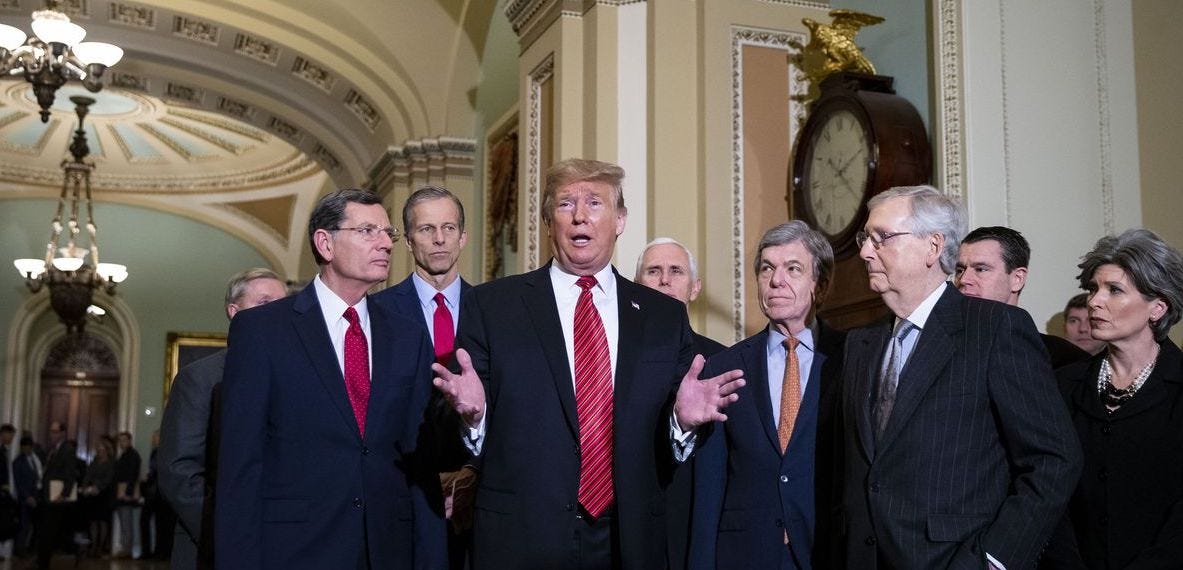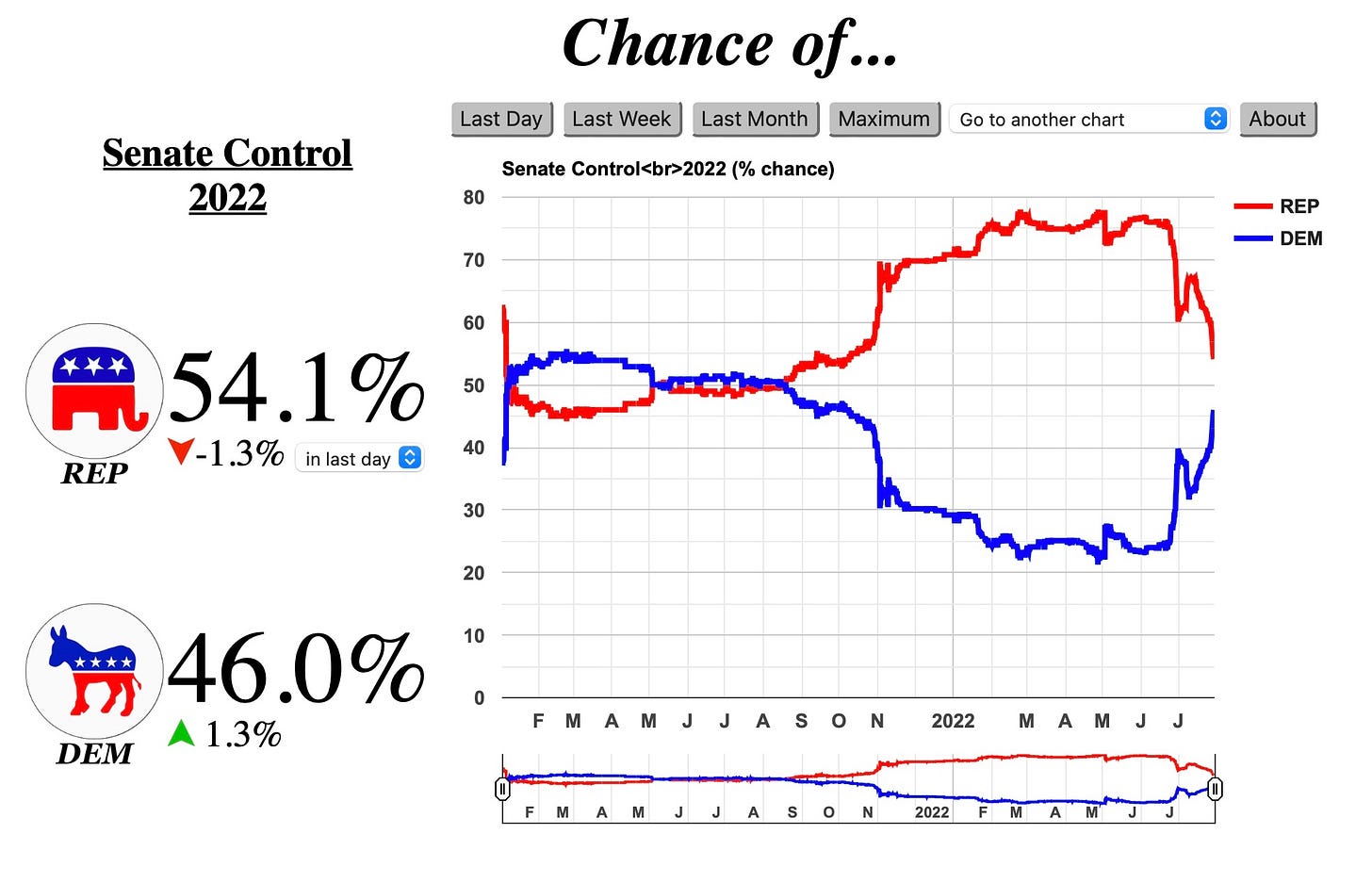Surfing the headlines last night, I saw a couple mentions that Senate control at the mid-term elections is now polling as a toss-up.
This can't be!, I thought to myself. The Democrats have so bungled the economy and so misread the national mood, with their green obsession, their endless woke, their border mess, their condoning of crime, and all the rest, that it's impossible to fathom the voters would leave them in charge of the upper chamber of Congress. Yet there it is, in red and blue. The gambling markets, generally less subject to polling biases than, well, polls, show a drop in GOP Senate control probability from over 75% to near-even.
The House, for the record, still remains extremely likely to go red.
The Republicans do have a structural disadvantage this election. Of the 34 seats in play, 20 are currently held by the GOP. Ballotpedia currently indicates 16 seats as solidly or likely Republican and 10 solidly or likely Democratic. That means the GOP needs to win 5 of 8 competitive races to take the Senate.
Those "competitive" states are Arizona, Georgia, Nevada, New Hampshire, North Carolina, Ohio, Pennsylvania, and Wisconsin. North Carolina and Ohio lean Team Red, New Hampshire leans Team Blue. This leaves us Arizona, Georgia, Nevada, Pennsylvania, and Wisconsin as toss-ups.
The Arizona, Georgia, Nevada, and New Hampshire races have a Democrat incumbent, and the Wisconsin race has a Republican incumbent. Republican incumbents in North Carolina, Ohio, and Pennsylvania are retiring, meaning that there's no incumbency benefit at play for those three Red seats. So, again, some structural disadvantage therein.
Nevertheless, as recently as June 22, the gamblers had the Senate going red at 75%.
What happened?
In a word, Dobbs. As in Dobbs v Jackson, as in the overturning of Roe v Wade, as in the abortion debate revved into the power band.
Still, many polls indicate that abortion isn't nearly as high on voters' minds as inflation, recession, crime, and other factors. While the correlation is a bit too strong to ignore, it's worth pondering the Senate more granularly than though a "national mood on abortion" filter.
What else happened?
In a word, Trump. Even discounting the January 6 dog-and-pony show and the balance of the Left's obsession, Trump's fingerprints are all over this election. He's holding rallies, he's raising funds, he's endorsing candidates. And, he's persisting in his "stolen election" claims, elevating them to a "with us or against us" litmus test.
His endorsements are at the heart of all this. He put Dr. Oz on the general ballot in Pennsylvania, Herschel Walker in Georgia, and J.D. Vance in Ohio, and is on track to putting Blake Masters up in Arizona. Among other endorsements - some that tipped scales, others that didn't.
Oz and Walker are problematic candidates. Oz is a reality show star (I wonder where I've seen that before) and a carpetbagger who eked out a primary win thanks to Trump. Walker recently revealed he's got some previously undisclosed love children with several different baby mamas. Vance may not have the same baggage, but he’s a political rookie going against a nine-term Congressman, and he has also had a couple miscues so far. Trump's endorsement pushed all three past other GOP hopefuls, and if their candidacies implode or otherwise fail to result in wins, it won't be unfair to lay blame at Trump's feet.
That's my take, anyway.
Like it or not, Trump's going to have an impact on the mid-terms.
That impact remains to be seen, and it will inform the next election cycle. If Trump's candidates win out, and the GOP takes the Senate, Trump will have something to brag about, and it'll make his very likely run (gamblers have it at 70%) at the White House a sure thing.
But, if the GOP fails to take the Senate, and an Oz or Walker or Vance or Masters loss is what tips the scale, Trump's "kingmaker" rep will take a hit, and he'll deserve as much blame for whatever the Democrats manage to do in the second half of Biden's term (including any Court appointments) as he does for screwing up the Georgia Senate races last year and handing the Senate to the Democrats.
This will only amplify if Trump announces a run for the White House ahead of the mid-terms.
In other words, the mid-term are likely to be, even discounting the Left's Trump Derangement Syndrome's role in keeping his name in high visibility, in no small part about Trump. And, as such, about the direction of the GOP going forward. Will Trumpism remain the driving paradigm of the GOP, or will his endorsement prove more negative than positive, and signal that this particular blend of populism and nativism isn't as popular as it once might have been? Or, will failure reflect on Trump personally, with his flavor of Republicanism persisting past the man himself?
If you enjoy The Roots of Liberty, please subscribe (if you have already, thank you!), and please recommend the blog to your friends! While I share it as much as I can on social media, subscribing ensures you won't miss a post.
If you really like The Roots of Liberty and want to help keep it rolling, please consider becoming a paying subscriber here at Substack, or at a lighter level as contributor to the blog via Patreon.
Thank you for your support!
Yours in liberty,
Peter.






Painfully insightful, Peter. Thank you!
The view from Ohio is not optimistic.
Billionaire Trump endorsee J.D. Vance ran so far to the right in a field crowded of Trumpists he has left himself vulnerable to losing to a 5-term liberal congressman who has worked hard to capture the center touting his areas of agreement with ... Trump... while rationally painting Vance as extreme.
Vance has been silent for the most part since the May primary.